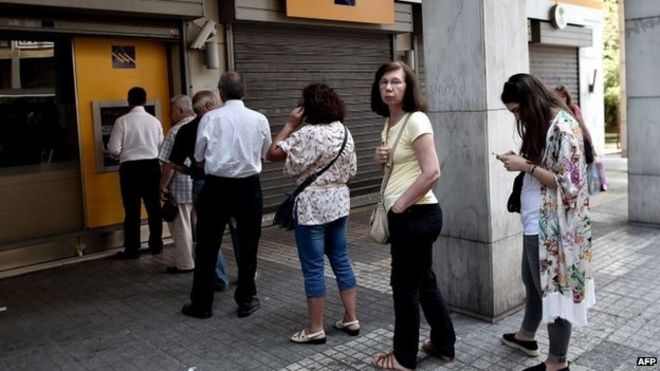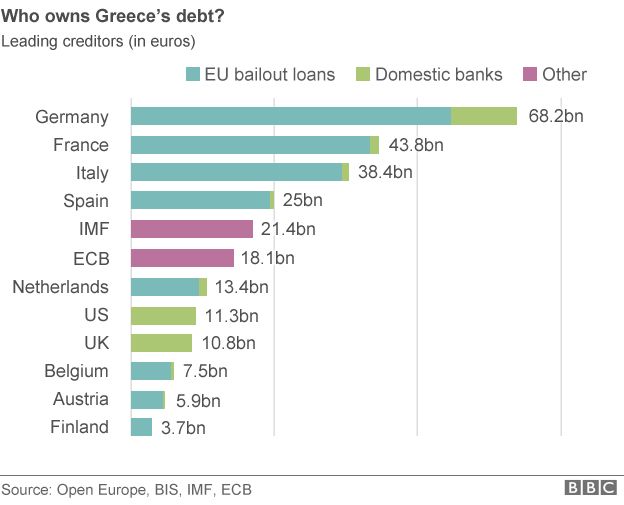
Withdrawals from cash machines in Greece are capped at just €60 a day
The Greek government has requested a new bailout deal from the eurozone, just hours before its bailout expires and it must repay €1.6bn (£1.1bn) to the International Monetary Fund (IMF).
Greece is reportedly asking for a new two-year aid deal from a bailout mechanism for eurozone countries.
Eurozone finance ministers will discuss the Greek offer in a teleconference on Tuesday evening.
If it fails to repay the IMF loan, Greece risks leaving the euro.
The European Commission, which is one of Greece’s creditors, wants Athens to raise taxes and cut welfare spending.
Amid fears of a Greek default on its huge public debt of €323bn – and a possible exit from the euro – long queues of people are continuing to snake from many cash machines in Greece, where withdrawals are capped at just €60 a day.
Analysis: By Chris Morris, BBC News, Brussels
Nothing if not dramatic, the Greek government has waited until well past the eleventh hour to request an entirely new third bailout.
It involves borrowing money from the eurozone’s permanent bailout fund, the European Stability Mechanism – there is no mention of the IMF.
But reaching an agreement on a third bailout could take weeks if not months.
So the letter the Greek government has sent to the ESM and the eurogroup also asks again for an extension to the current bailout – in order to ensure that a technical default is not triggered.
The trouble is that the level of political distrust between Greece and its creditors is so high at the moment that any progress will be difficult to achieve.
Loans from the ESM come with conditions attached – conditions which would include many of the economic and structural reforms that the two sides have been haggling over for months.
But the alternative to yet more talks on finding a deal? A massive step into the unknown for all concerned.
Greek banks did not open this week after talks between Greece and its creditors broke down.
However, up to 1,000 bank branches will re-open from Wednesday to allow pensioners – many of whom do not use bank cards – to withdraw up to €120.
The European Commission offered a slightly amended deal to Greece late on Monday night, which the Greek government did not accept.
Instead, Greece responded with a request for a two-year deal under the European Stability Mechanism (ESM), the bailout mechanism for eurozone countries whose aim is to maintain the stability of the euro.
The ESM did not exist when Greece was bailed out in 2010 and 2012.
Eurozone finance ministers will discuss the offer in a teleconference at 17:00 GMT, Dutch Finance Minister Jeroen Dijsselbloem announced.
However, German Chancellor Angela Merkel has reportedly told German MPs that the eurozone’s wealthiest member will not enter into new aid negotiations with Greece before its weekend referendum.
A referendum is due to take place in Greece on Sunday over whether the country should accept its creditors’ proposals.
EU leaders have warned that a rejection would mean Greece leaving the eurozone – though Mr Tsipras says he does not want this to happen.
The EC says that if funds were to be released, Mr Tsipras and his party must back the “yes” vote in the referendum.
What will happen next?
01:00 Greek time Wednesday (22:00 GMT): Greece’s €1.6bn repayment to the IMF is due.
5 July – the referendum on creditors’ proposals, and many say Greece’s membership of the eurozone, takes place
20 July – Greece must redeem €3.46bn of bonds held by the European Central Bank. If it fails to do so, the ECB can cut off Greece’s access to emergency loans.

On Monday Mr Tsipras appealed to Greeks to reject the creditors’ proposals, saying this would give Greece “more powerful weapons” in negotiations.
He also hinted that he would resign if the result of the referendum was a “yes” vote.
“If the Greek people want to proceed with austerity plans in perpetuity, which will leave us unable to lift our head… we will respect it, but we will not be the ones to carry it out,” he said.

Meanwhile, European Commission President Jean-Claude Juncker said he felt betrayed by the Tsipras-led government and called on Greek voters to oppose him.
The ECB is believed to have disbursed virtually all of its emergency funds for Greece, amounting to €89bn (£63bn).
BBC
 Q FM Africa's Modern Radio
Q FM Africa's Modern Radio